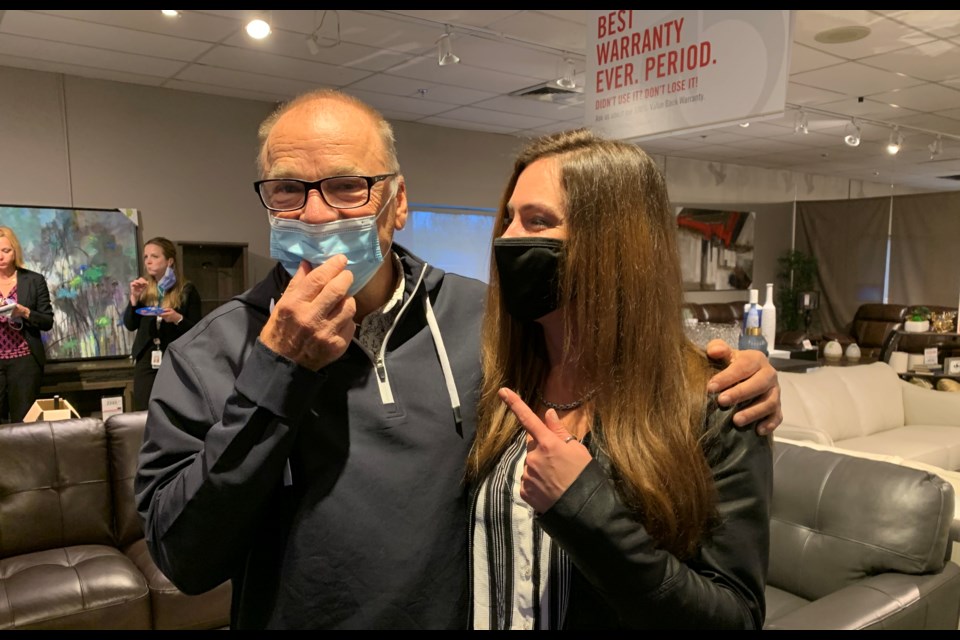Supported by a loving family, North Bay businessman Paul Lalonde will soon get the Christmas gift of a lifetime...the gift of life in the form of a new kidney.
And it comes from someone very close to the owner of The Brick...his stepdaughter Jenna.
The story starts when Paul and his wife Annette were vacationing in Florida in 2018 and he came down with a serious infection that resulted in sepsis. It attacked his major organs causing renal failure and a massive heart attack among other complications.
After 22 days in ICU, the couple returned home to North Bay with Paul's health still extremely fragile. He immediately started dialysis at North Bay Regional Health Centre which became his lifeline. The treatment is basically life support. Go off it, you die. A couple of times Paul wanted to quit, but Annette says "he stuck with it."
Paul was placed on the transplant list for a kidney and pancreas, receiving dialysis three times a week.
"It wasn’t long before we received the call we had been waiting for – they had a kidney and pancreas for me. Annette and I travelled to Toronto. Only 45 minutes before surgery, it was cancelled – one of the organs wasn’t viable. It was devastating news."
The pair returned to North Bay to await the next call.
"Two more times we received a call, and two more times the transplants were cancelled. After further cardiac complications in 2019 and surgical delays due to COVID, I underwent quadruple bypass surgery in May 2020. I was told I could go back on the transplant list following six months of healing. That would not be the case."
So many surgeries were put on hold due to the pandemic and the transplant list was getting longer. Your position on the list is determined by a patient’s best chances for survival.
"I was no longer considered a candidate for a double transplant. The only option remaining was to find a living donor for a kidney transplant."
Without hesitation, both of his stepdaughters, Jenna and Michelle, stepped forward as potential donors.
Jenna was identified as a match and surgery is expected to take place in late January. She says her response was immediate.
"This is my Dad. I'm going to help him. He'd definitely do the same for me. You've got to take care of your family."
She adds, she has no regrets.
"Sure there are risks, but the probability is so low in comparison to what happens if he doesn't get the kidney and dying way too young. (62) It far outweighs the risks of me running on one kidney."
"This is the greatest gift my stepdaughter could ever give to me. It is truly a gift of life – my life," Paul writes. "Until then, I continue to receive life-saving renal dialysis three times a week at NBRHC."
Jenna Irwin is a single parent with two children so this will be quite a sacrifice. When her daughters offered a kidney, "My heart broke," Annette told BayToday.
"I'll be honest. I was conflicted because I was so proud of them, but at the same time I was scared because now I have a husband who will go through major surgery to receive a kidney and one of my daughters will be going through that same surgery and having the kidney removed. Jenna is only 35. I'm scared stiff. What if something happens? She's a young mom with a 10 and an eight-year-old, so these are severely conflicting emotions for me, but for Michelle and Jenna there was never any doubt. They would have walked across hot coals to donate their kidneys to save him. He doesn't have a lot of time left."
But despite her fears,..."It's an emotional roller coaster" Annette remains optimistic.
"Michelle and Jenna are both extremely strong women. Paul has shown strength and resilience through all of this and survived. He rarely complains. He's strong, resolute, and stoic. I have faith that this will work. We're in good hands with the doctors. They're amazing. I have to believe it will all turn out."
One major risk, as it turns out is the mental well-being of the patient and donor.
"How are you going to handle it if the worst-case scenario happens where he's not getting up from the surgery. But it doesn't really matter," adds Jenna. "We've got to try."



